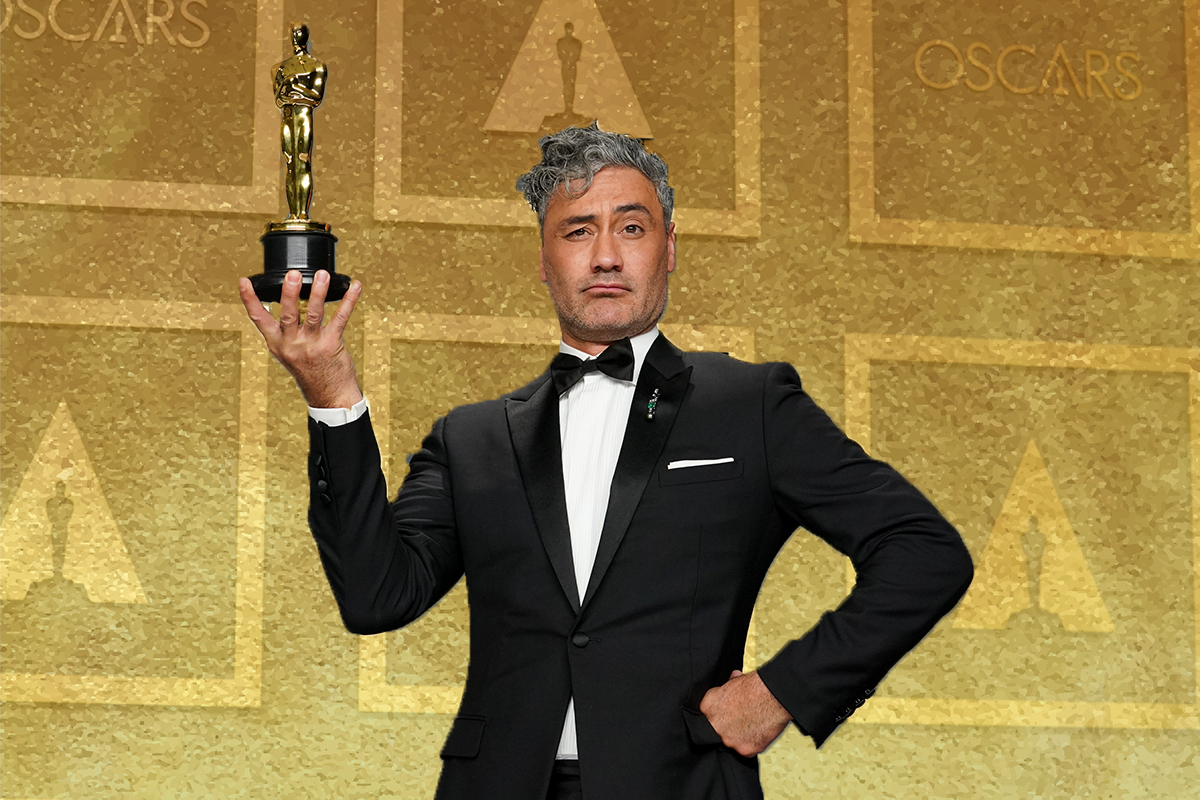At the 2020 Oscars, Taika Waititi stole all our hearts. I mean — he already had them. But Waititi, who directed, wrote, and starred in Jojo Rabbit, won an Oscar for Best Adapted Screenplay. I’ll get to that in a bit, though, because first I want to talk about when Waititi, who is Jewish and Māori (an Indigenous people from New Zealand), made history in a quick moment halfway through the ceremony when he shared a land acknowledgement.
It was the first time a land acknowledgement speech — a statement that recognizes and pays tribute to the original inhabitants of a specific land — was made in the 92-year history of the awards show. Typically, land acknowledgements take place at the start of the event, whether it’s a ceremony or sports game — in Australia, Canada, and elsewhere, many events begin with Acknowledgment of Country. (The United States has a lot of work to do.)
“The Academy would like to acknowledge that tonight we have gathered on the ancestral lands of the Tongva, the Tataviam, and the Chumash. We acknowledge them as the first peoples of this land on which the motion pictures community lives and works.”
By acknowledging the Indigenous people who lived in what is now Los Angeles, Waititi was bringing history to the notoriously white Oscars ceremony. In Oscars history, only eight Indigenous people have ever been nominated, a total of 10 times (Waititi has been nominated three times). And, only three Indigenous people have ever won — one of which, for Wes Studi last year, was an Honorary Award.
My first time hearing a land acknowledgement at the #Oscars. Thank you @TaikaWaititi!!
I would be more annoyed that it takes an Indigenous person being on stage for this basic thing to happen if I wasn’t so fucking happy that THERE IS AN INDIGENOUS PERSON ON STAGE. https://t.co/qRmrlyFnnV
— Rebecca Nagle (@rebeccanagle) February 10, 2020
Waititi became the first Indigenous director to win at the Oscars. During his acceptance speech, Waititi dedicated his award to “all the Indigenous kids in the world who want to do art and dance and write stories. We are the original storytellers and we can make it here as well.” He ended his speech by saying, “Thank you, kia ora,” a Māori phrase that means “be safe.”
Also, Jewish actress Natalie Portman and Jewish actor Timothée Chalamet presented Taika Waititi with his Oscar, and then proceeded to take a million amazing photos in the press room together. (Waititi is set to direct Natalie as Thor in Thor: Love & Thunder, coming out next year.)
we're literally never gonna stop talking about this #Oscars https://t.co/kC8dmbZWrT pic.twitter.com/7hH2U9kdvB
— Hey Alma (@hey_alma) February 10, 2020
It goes without saying that Waititi’s win — a Jewish Indigenous man making a film about Hitler in the face of rising anti-Semitism — is a big fucking deal. As news of the film came out, there were a lot of discussions over Waititi’s decision to portray Hitler himself. He silenced any critics with a to-the-point tweet: “What better way to insult Hitler than having him portrayed by a Polynesian Jew?”
His mom, Robin Cohen, was the one who gave him the book Caging Skies by Christine Leunens, which Jojo Rabbit is based on, encouraging him to adapt it into a movie. In his acceptance speech, Waititi addressed his mother, saying, “Thank you for being my mother, and for many other reasons, but for giving me the book that I adapted. This film wouldn’t have existed without you doing that.”
https://twitter.com/jbillinson/status/1226684574505324544?s=20
Cohen explained to Variety that while we know Hitler was an evil madman, we don’t think about the ways in which he convinced the world to follow him. And when we don’t think about this — we “leave the door open to a repeat performance.” She continued, “When Taika depicts him as the affable hero of a small boy’s imagination, our idea of Hitler is skewed like a needle scratching across a record. This imaginary Hitler reminds us of an uncomfortable reality — that in the right climate, what we come to imagine can be deadly.”
And obviously, his Jewish mom loved her son’s work, if not his mustache. “I was especially pleased with Taika’s cartoonish presentation as a way to ridicule fascism. For me, it’s a brave, clever, wryly funny film that, best of all, ends with hope.” (My feelings exactly, Robin Cohen!)
Also, this:
https://twitter.com/SarahPilchick/status/1226683942482436097?s=20
As I wrote in Alma after seeing Jojo Rabbit, subconsciously or not, Waititi’s film picked up on the very Jewish idea of dancing as freedom. The movie ends with a joyous celebration of freedom, of the Nazis being defeated, and the idea that we can overcome hate. It’s exactly what we need right now. Many critiques of the film focused on how it dealt too lightly with the subject mater — but it felt right at home in the grand Jewish tradition of dealing with trauma through comedy.
To close, some good tweets:
Taika Waititi shouting out indigenous artists while accepting an award for a film he made lampooning Nazis is the JOC excellence energy we are bringing in 2020 https://t.co/xjC7AKti1m
— Rebecca Pierce (@aptly_engineerd) February 10, 2020
https://twitter.com/benwheatleys/status/1226691391436345345?s=20
https://twitter.com/lighterature/status/1225941633574821888?s=20
It always makes me giggle when people (especially fellow Jews) are like "oh wow I didn't know @TaikaWaititi was Jewish." Like this is the guy who gave us "Asgard isn't a place, it's a people," and that's such a #JewishMood honestly
— @vaspider.gay on BlueSky (@vaspider) February 10, 2020
https://twitter.com/maxsparber/status/1226710788469141504?s=20
Love you, Taika! Off to re-watch What We Do in the Shadows 10,000 more times!
Header Image: Taika Waititi, winner of Best Adapted Screenplay for “Jojo Rabbit,” poses in the press room during the 92nd Annual Academy Awards, by Rachel Luna/Getty Images



